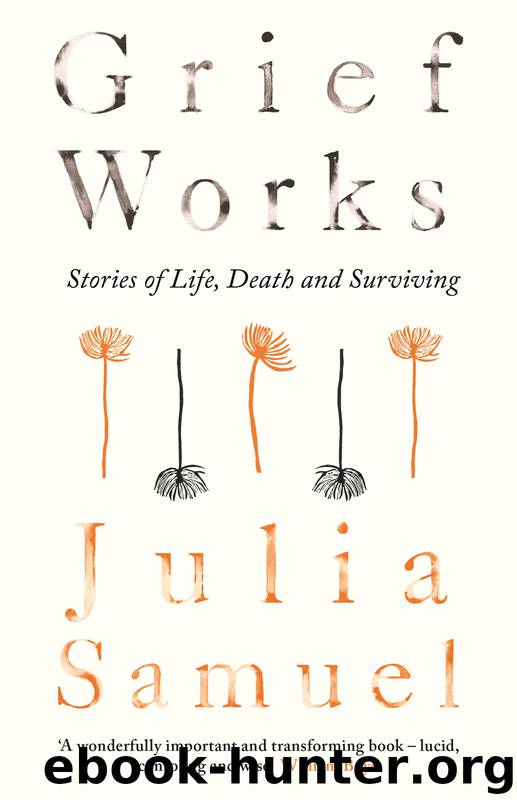Grief Works by Julia Samuel

Author:Julia Samuel
Language: eng
Format: epub
ISBN: 9780241270752
Publisher: Penguin Books Ltd
Published: 2016-12-14T05:00:00+00:00
Reflections
Each of these case studies is a complex psychological portrait of people contending with a difficult death. I was drawn to write about them because I’d had particularly powerful relationships with these clients – relationships that stayed alive in me long after our work had finished.
The ideal sibling relationship gives you your ‘team’: the people who are on your side, through thick and thin, for the rest of your life. The expression ‘an only child’ contains within it the sense of one not being quite enough. The power of the sibling bond can overcome years of non-communication; brothers and sisters are forever connected through shared genetics, history, secrets, memories and language.
While few adult siblings have severed their ties completely, approximately one third describe their relationship as rivalrous or distant. But this, of course, would not make the death of their brother or sister less difficult; it would simply add a layer of complexity – the loss of the opportunity to repair what was broken and regret for the actions of the past tend to bring with them their own attendant pain.
The largest group of sibling deaths is in the older population, and these generations usually don’t seek counselling. Although 80 per cent of the population have a sibling, we as a society give it less acknowledgement than it deserves as a key relationship in our lives. There isn’t, for instance, a sibling support group in the way there is for widows or bereaved parents. Contemporary research is beginning to show that siblings have a much greater influence on the development of our personality than has been assumed up to now – which means that their deaths will have a concomitant impact and affect us profoundly.
My experience with clients is that the greater the emotional depth in the relationship, the greater chance the therapy has of doing some good. When clients trust the relationship, it frees them to trust themselves, and connect to the core of what is troubling them. As they reveal hidden, usually shame-based aspects of themselves to me, they are also revealing them to themselves – which, paradoxically, allows them to become more accepting of them. My belief is that the potential for depth is co-created by both partners in the therapeutic relationship: I can only go so far if someone won’t open up to me. I would argue that this is true of the closest friendships too, in that when we are open and honest with each other, without judging, the richer the friendship becomes.
Download
This site does not store any files on its server. We only index and link to content provided by other sites. Please contact the content providers to delete copyright contents if any and email us, we'll remove relevant links or contents immediately.
They Both Die at the End by Adam Silvera(9818)
Thirteen Reasons Why by Jay Asher(8910)
The Space Between by Michelle L. Teichman(6941)
Suicide Notes by Michael Thomas Ford(4827)
Tuesdays with Morrie by Mitch Albom(4784)
Suicide: A Study in Sociology by Emile Durkheim(3023)
The Checklist Manifesto by Atul Gawande(2854)
Tuesdays With Morrie by Mitch Albom(2762)
In the Woods by Tana French(2599)
Bossypants by Tina Fey(2532)
Robin by Dave Itzkoff(2441)
Olive Kitteridge by Elizabeth Strout(2372)
No Ashes in the Fire by Darnell L Moore(2333)
Reservoir 13 by Jon McGregor(2303)
End of Days by Sylvia Browne(2187)
All Things New by John Eldredge(2162)
Bus on Jaffa Road by Mike Kelly(2160)
Scar Tissue by Anthony Kiedis(2136)
No Time to Say Goodbye(2117)
